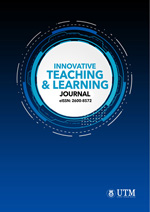Practical Research on Flipped Classroom Teaching Model in College English Based on Production-Oriented Approach
DOI:
https://doi.org/10.11113/itlj.v7.138Keywords:
production-oriented approach, flipped learning, English teachingAbstract
In the context of integrating technology into higher education and the widespread acceptance of a learning-centered philosophy, flipped learning (FL) is gaining popularity as a flexible new approach. To overcome the problem of input-output separation in the traditional text-centered teaching and learning paradigm in tertiary education in China, a flipped classroom teaching model based on the theory of the Production Oriented Approach (POA) was proposed and implemented for a vocational English course. Mixed research methods, including testing, questionnaire surveys, and interviews, were used to validate the effect of the model. Data analysis shows a notable enhancement in the mastery of new target language items among the experimental class that adopted the flipped classroom teaching model based on the POA. Moreover, this practice also has changed their learning behaviors both in and after class, increasing their time investment in learning and improving their performance and engagement in class, thus enhancing their autonomy in language learning. This study empirically supports the flipped classroom teaching model based on the POA. It aids in transforming traditional input-driven teaching into output-driven teaching and serves as a teaching reference for practitioner teachers.

















